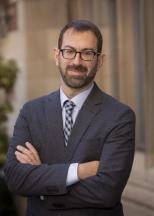Human Rights in the Neoliberal Maelstrom
Samuel Moyn, Professor of Law and History at Yale University
Matrix is located on the 8th floor of Barrows Hall, on the UC Berkeley campus, near Telegraph and Bancroft Avenues, just up the hill from Sather Gate. There are entrances at both ends of the building, but only one of the elevators on the eastern side goes directly to the 8th floor. You can alternatively take the stairs to the 7th floor and walk up the stairs.

Please join us on March 15 for a presentation by Samuel Moyn, Professor of Law and History at Yale University, entitled "Human Rights in the Neoliberal Maelstrom." Marianne Constable, Professor of Rhetoric at UC Berkeley, will be the discussant.
A reception for Samuel Moyn’s forthcoming book, Not Enough: Human Rights in an Unequal World, will precede the talk from 3:00-3:30pm.
This event is part of the Rhetoric Spring Colloquium, and is co-sponsored by Social Science Matrix and the Human Rights Program.
About the Speaker
Samuel Moyn is professor of law and professor of history at Yale University.
He received a doctorate in modern European history from the University of California-Berkeley in 2000 and a law degree from Harvard University in 2001. He spent thirteen years in the Columbia University history department, where he was most recently James Bryce Professor of European Legal History, and three at Harvard University, where he was Jeremiah Smith, Jr. Professor in the law school as well as professor in the department of history.
He has written several books in his fields of European intellectual history and human rights history, including The Last Utopia: Human Rights in History (Harvard University Press, 2010), and edited or coedited a number of others. His most recent book, based on Mellon Distinguished Lectures at the University of Pennsylvania in fall 2014, is Christian Human Rights (2015). His new book, Not Enough: Human Rights in an Unequal World, is forthcoming from Harvard University Press in April 2018.
His areas of interest in legal scholarship include international law, human rights, the law of war, and legal thought, in both historical and current perspective. In intellectual history, he has worked on a diverse range of subjects, especially twentieth-century European moral and political theory.
He is a coeditor of the journal Humanity. He helps with several book series: the Brandeis Library of Modern Jewish Thought, the Cambridge University Press “Human Rights in History” series, and the University of Pennsylvania Press “Intellectual History of the Modern Age” series. For seven years, he served as coeditor of Modern Intellectual History. He serves on the editorial boards of Constellations, Global Intellectual History, the Historical Journal, the Journal of the History of International Law, and Modern Judaism.
About the Social Science Matrix Solidarity Series
The Matrix Solidarity talks and panels, sponsored or co-sponsored by the Social Science Matrix, will explore—and critique—the ethical foundations, concrete implementations, and prospective designs that have fostered or may foster connectedness, inclusiveness, and tolerance in a fragmented, exclusionary, and uncharitable world. These conversations, we hope, will be both an argument on behalf of the premises and practices of solidarity, and an exposition of the potential of the social sciences to contribute to it.
We live in a precarious historical moment, marked by defiance and divisiveness. In many places throughout the globe, the concentration of wealth among the very few, policies that favor the better off, and the dismantling of collective goods and social protections have fueled disaffection among those left behind—and, more recently, a turn toward populist politics. Shared—if not always adhered to—international norms of democracy and human rights are giving way to camaraderie among would-be despots and an upswing in nationalist, separatist, or sectarian movements. Social media has magnified the power of hoaxes and propaganda, and feeds eroding trust in fundamental social institutions.
This new reality poses a fundamental challenge to the very premises upon which the social sciences are founded. Both the public university and the disciplines it houses share the idea that the success of human society has depended on the development of common understandings and empathy, exchange and cooperation, resource sharing, and collective goals. It is incumbent on social scientists, then, not just to speak up on behalf of these values, but to mobilize their distinctive capacity to show how human societies have in the past—and therefore can in the future—rekindle the ties that bind people and groups together, revive a sense of shared fate and solidarity, and restore faith in the public purpose.
Although the differences between competing visions are stark, the present moment poses unique dilemmas that demand careful analysis and reflection. In the United States, Donald Trump’s election has fueled revanchist white nationalism even as it revealed unaddressed suffering in post-industrial and rural America. What kind of solidarity can exist between parties locked in bitter political conflict? Similarly, right-wing populism in Europe has drawn strength partly on the claim that it is only through exclusion that the achievements of post-War welfare states will be preserved. How should we respond to claims that in a world of ecological limits and fiscal retrenchment, we can only take care of our own?
The pernicious effects of a decline in social solidarity are clear; the way forward is less so. Strikingly, even a wholesale attack on progressive values has not led to any pause in factional infighting over how to defend them. It is here that we believe that the combined strengths of the social sciences can help spark or sustain a productive conversation.



